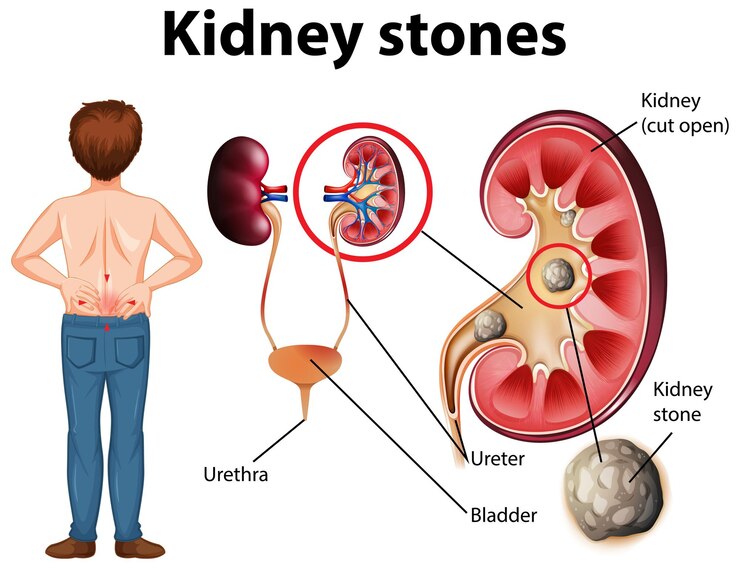Kidney Stones: Causes, Symptoms, and Treatment
Kidney stones, crystalline deposits formed in the kidneys, affect millions worldwide, causing significant discomfort and pain. Dr. Dushyant Nadar, renowned as the best doctor for kidney stones near me, provides insights into the causes, symptoms, and various treatment options for managing this common condition.
Overview of Kidney Stones
Kidney stones are solid mineral and salt deposits that develop in the kidneys, affecting urinary function. They vary in size, ranging from tiny grains to larger stones that obstruct the urinary tract, causing severe pain and complications.
Common Causes of Kidney Stones
Several factors contribute to the formation of kidney stones:
- Dehydration: Insufficient fluid intake reduces urine volume, leading to concentrated urine and the formation of crystals.
- Dietary Factors: High intake of oxalate-rich foods (such as spinach, nuts, and chocolate), salt, and animal protein can contribute to stone formation.
- Medical Conditions: Certain medical conditions, like urinary tract infections, gout, and metabolic disorders, increase the risk of kidney stones.
Symptoms and Diagnosis
Symptoms of kidney stones often manifest suddenly and can include severe pain in the back or side (often radiating to the lower abdomen), bloody or cloudy urine, frequent urination, and nausea/vomiting. Dr. Dushyant Nadar emphasizes the importance of seeking medical attention upon experiencing these symptoms for proper diagnosis and management.
Diagnosis involves a combination of medical history, physical examination, urine tests, blood tests, and imaging studies such as ultrasound or CT scans to confirm the presence of kidney stones and their size/location.
Treatment Options
The choice of treatment for kidney stones depends on their size, location, and severity of symptoms:
- Hydration: Drinking plenty of fluids helps flush out smaller stones and prevents new ones from forming.
- Medications: Pain-relieving medications (such as NSAIDs) and medications to relax the ureter muscles and facilitate stone passage may be prescribed.
- Extracorporeal Shock Wave Lithotripsy (ESWL): This non-invasive procedure uses shock waves to break larger stones into smaller fragments for easier passage through urine.
- Surgery: Surgical intervention, like ureteroscopy or percutaneous nephrolithotomy (PCNL), may be necessary for larger stones that don’t pass on their own.
Prevention Strategies
Dr. Dushyant Nadar highlights key strategies to prevent kidney stones:
- Hydration: Ensuring adequate fluid intake to maintain urine dilution and prevent crystal formation.
- Dietary Changes: Modifying the diet to control salt, oxalate, and animal protein intake may reduce the risk of stone formation.
- Medications: Depending on the stone’s composition and underlying conditions, medications may be prescribed to prevent stone recurrence.
Conclusion: Managing Kidney Stones Effectively
Kidney stones can be extremely painful and disruptive, but with timely intervention and preventive measures, their impact can be reduced. Dr. Dushyant Nadar’s expertise underscores the importance of awareness, early diagnosis, and adopting preventive strategies to manage kidney stones effectively.
In conclusion, understanding the causes, recognizing symptoms, seeking timely medical attention, and adopting preventive measures are crucial in managing kidney stones. Best Doctor for Kidney Stones Near me, Dr. Dushyant Nadar’s expertise emphasizes the significance of early intervention and lifestyle modifications to alleviate the burden of kidney stones and promote better urinary health.


Comments are closed